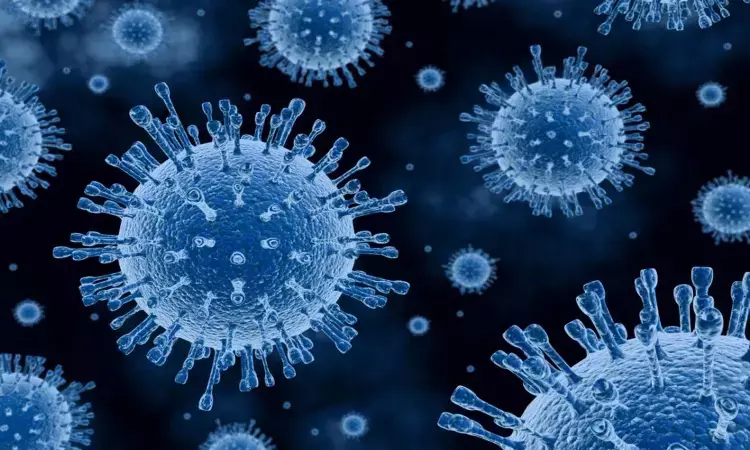- Home
- Medical news & Guidelines
- Anesthesiology
- Cardiology and CTVS
- Critical Care
- Dentistry
- Dermatology
- Diabetes and Endocrinology
- ENT
- Gastroenterology
- Medicine
- Nephrology
- Neurology
- Obstretics-Gynaecology
- Oncology
- Ophthalmology
- Orthopaedics
- Pediatrics-Neonatology
- Psychiatry
- Pulmonology
- Radiology
- Surgery
- Urology
- Laboratory Medicine
- Diet
- Nursing
- Paramedical
- Physiotherapy
- Health news
- Fact Check
- Bone Health Fact Check
- Brain Health Fact Check
- Cancer Related Fact Check
- Child Care Fact Check
- Dental and oral health fact check
- Diabetes and metabolic health fact check
- Diet and Nutrition Fact Check
- Eye and ENT Care Fact Check
- Fitness fact check
- Gut health fact check
- Heart health fact check
- Kidney health fact check
- Medical education fact check
- Men's health fact check
- Respiratory fact check
- Skin and hair care fact check
- Vaccine and Immunization fact check
- Women's health fact check
- AYUSH
- State News
- Andaman and Nicobar Islands
- Andhra Pradesh
- Arunachal Pradesh
- Assam
- Bihar
- Chandigarh
- Chattisgarh
- Dadra and Nagar Haveli
- Daman and Diu
- Delhi
- Goa
- Gujarat
- Haryana
- Himachal Pradesh
- Jammu & Kashmir
- Jharkhand
- Karnataka
- Kerala
- Ladakh
- Lakshadweep
- Madhya Pradesh
- Maharashtra
- Manipur
- Meghalaya
- Mizoram
- Nagaland
- Odisha
- Puducherry
- Punjab
- Rajasthan
- Sikkim
- Tamil Nadu
- Telangana
- Tripura
- Uttar Pradesh
- Uttrakhand
- West Bengal
- Medical Education
- Industry
Lopinavir/ritonavir and Arbidol not found effective in COVID-19

Researchers have found that lopinavir/ritonavir or Arbidol--antivirals do not benefit patients of mild to moderate Covid 19 v patients.
An exploratory randomized, controlled study on the safety and efficacy of either lopinavir/ritonavir (LPV/r) or Arbidol--antivirals that are used in some countries against HIV-1 and to treat influenza , respectively--as treatments for COVID-19, the disease caused by the novel coronavirus SARS-CoV-2, suggests that neither drug improves the clinical outcome of patients hospitalized with mild-to-moderate cases of the disease over supportive care. The findings appeared April 17 in Med, a new medical journal published by Cell Press.
"We found that neither lopinavir/ritonavir nor Arbidol could benefit clinical outcomes for patients and that they might bring some side effects," says co-senior author Linghua Li, Vice Director of the Centre for Infectious Diseases of Guangzhou Eighth People's Hospital in Guangzhou, China. "And although the sample size is small, we believe it could still provide meaningful suggestions for proper application of LPV/r or Arbidol for COVID-19."
The researchers chose to study LPV/r and Arbidol because the antivirals had been selected as candidates for treating COVID-19 in a guidance issued on February 19, 2020, by the National Health Commission of China, based on in vitro cell tests and previous clinical data from SARS and MERS. Other researchers had already found that LPV/r did not improve outcomes for patients with severe COVID-19. "It is important to know if lopinavir/ritonavir is effective for mild/moderate cases with COVID-19," Li says. "If it is, the medicine could prevent mild/moderate cases from deteriorating to severe status and help reduce the mortality rate."
The study assessed 86 patients with mild-to-moderate COVID-19, with 34 randomly assigned to receive LPV/r, 35 to Arbidol, and 17 with no antiviral medication as a control. All three groups showed similar outcomes at 7 and 14 days, with no differences between groups in the rates of fever reduction, cough alleviation, or improvement of chest CT scan. Patients in both drug groups experienced adverse events such as diarrhea, nausea, and loss of appetite during the follow-up period, while no apparent adverse event occurred in the control group.
"Our findings suggest that we need to cautiously consider before using these drugs," Li says. "Researchers need to keep working to find a really effective antiviral regimen against COVID-19, but meanwhile, any conclusions about antiviral regimens need strict and scientific clinical trials and appropriate caution. The general public, however, shouldn't panic just because currently there's no specific antiviral medicine currently. Quarantine and good personal health protection could help us prevent people from getting infected with COVID-19, and even in case of infection, the present comprehensive treatment can still enable the vast majority of patients to return to health."
Hina Zahid Joined Medical Dialogue in 2017 with a passion to work as a Reporter. She coordinates with various national and international journals and association and covers all the stories related to Medical guidelines, Medical Journals, rare medical surgeries as well as all the updates in the medical field. Email: editorial@medicaldialogues.in. Contact no. 011-43720751
Dr Kamal Kant Kohli-MBBS, DTCD- a chest specialist with more than 30 years of practice and a flair for writing clinical articles, Dr Kamal Kant Kohli joined Medical Dialogues as a Chief Editor of Medical News. Besides writing articles, as an editor, he proofreads and verifies all the medical content published on Medical Dialogues including those coming from journals, studies,medical conferences,guidelines etc. Email: drkohli@medicaldialogues.in. Contact no. 011-43720751


